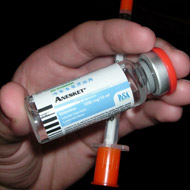The AVMA are calling on veterinary surgeons to write to the FDA to explain how critical ketamine is to veterinary medicine and why it must remain available.
Scheduling change would restrict access to the drug
The World Health Organisation (WHO) are being urged by the American Veterinary Medical Association (AVMA) to reconsider an international proposal to tighten up on ketamine use, saying that it is 'critical' to veterinary medicine.
In the United States, ketamine is currently a Schedule 2 drug under the Controlled Substance Act, and strict regulations and safeguards are in place to help prevent its illegal use.
However, in April the WHO received a proposal from China to regulate ketamine as a Schedule 1 drug, which would mean that it would no longer be available to US practitioners.
The AVMA, together with the World Veterinary Association and the World Medical Association, fiercely advocated against the change, which meant that it was not rescheduled at the time.
However, earlier this month the US Food and Drug Administration (FDA) issued a request for comments regarding the abuse potential and the impact of scheduling changes of 10 drug substances - including ketamine.
Now the AVMA are calling on veterinary surgeons to write to the FDA to explain how critical ketamine is to veterinary medicine and why it must remain available.
The comments will be considered as FDA prepare a response to the WHO regarding the use and liability and diversion of the drugs.
Commenting on the proposals, Patrick Hackett, a vet from Knox County, told WBIR.com: "I've probably spayed and neutered 50,000 animals in Knox County using that drug," he said. "If it's no longer available, I'll have to use other alternatives that may not be as safe and certainly may be more expensive."
He hopes people will write letters to their congressmen regarding ketamine since it does have beneficial uses in keeping pets healthy during surgery.
"This drug has good uses, and the fact that a few people abuse it shouldn't be taken away from the masses that do enjoy the benefits of this drug," he said.
According to the AVMA, the letters will be passed to the FDA, who's comments will be heard at the 36th Expert Committee of Drug Dependance, which will meet in Geneva, 16-20 November.
Image (C) Wikimedia/Psychonaught







 The BSAVA has opened submissions for the BSAVA Clinical Research Abstracts 2026.
The BSAVA has opened submissions for the BSAVA Clinical Research Abstracts 2026.
